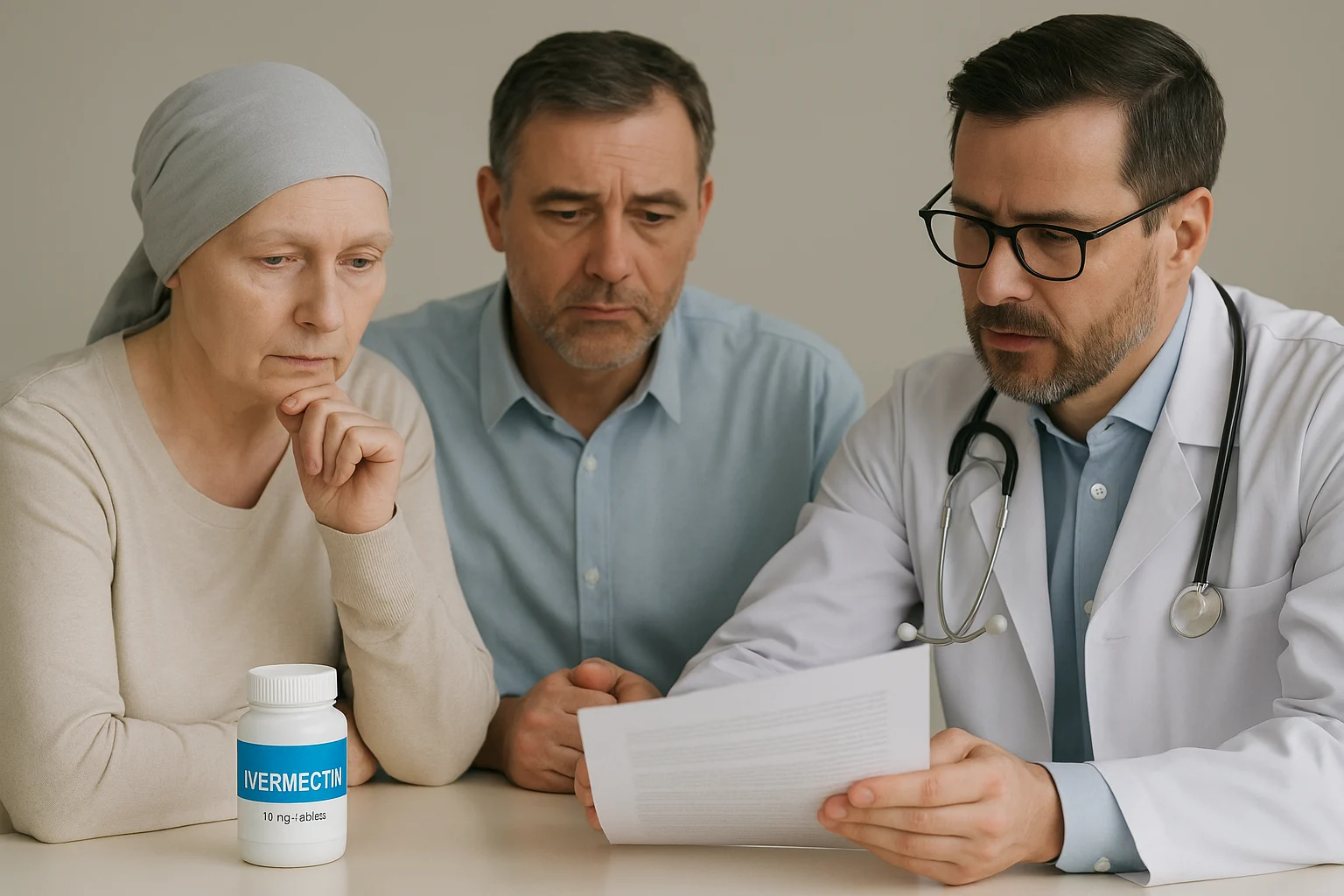When someone has a serious illness like cancer or COVID-19, they and their families often feel overwhelmed by the many treatment options available to them, some of which are proven and others that are not. Ivermectin is one of the most talked-about drugs; it got a lot of attention during the pandemic. But how do you tell the difference between fact and hype, especially when lives are at stake? This blog will help you find your way through the ivermectin maze by giving you a calm, evidence-based view that will help you make smart, responsible choices when things get tough.
What Patients and Families Should Know About Ivermectin
Why Ivermectin Is So Controversial, and What Is It?
Ivermectin was first created as an anti-parasitic drug and has been used in humans and animals without incident for many years. It works well for scabies and river blindness. Nevertheless, despite the lack of solid scientific evidence, claims regarding its ability to treat the COVID-19 virus generated intense international discussion during the pandemic.
Ivermectin’s Approved and Off-Label Uses
Ivermectin is authorized for the treatment of parasitic infections in the United States and numerous other nations. Its use for cancer or COVID-19, however, is regarded as “off-label,” which means that it is not formally authorized for those uses. Off-label use is permitted, but it should always be directed by medical professionals rather than online fads.
vermectin in Relation to COVID-19 and Cancer
Ivermectin was promoted by some groups in COVID-19 on the basis of small or poorly controlled studies. Although there is still a lack of human evidence, some alternative medicine circles point to lab studies for cancer. Prior to choosing a course of treatment, it is crucial to comprehend this context.
Ivermectin’s Ascent During COVID-19 and Its Long-Term Effects
How the COVID-19 Epidemic Put Ivermectin in the Public Eye
Early in the pandemic, many people were desperate for treatments and resorted to easily accessible drugs like ivermectin. Self-medication increased as a result of the rapid spread of false information via social media, forums, and even some public figures.
Social media, the media, and the dissemination of false information
YouTube “doctors,” WhatsApp forwards, and TikTok videos all added to an unclear and frequently false narrative. In the absence of explicit instructions, many patients were left to navigate unverified claims alone.
Lessons from the COVID-19 Era Still Relevant in 2025
The ivermectin story serves as a cautionary tale for both COVID-19 and other conditions like cancer: don’t let desperation override evidence. It also highlights the importance of seeking guidance from trained medical professionals, not influencers.
Evaluating the Evidence: Is Ivermectin Effective or Harmful?
Clinical Trials and Systematic Reviews: What Do They Show?
Recent large-scale clinical trials, including those published by the NIH and WHO, consistently show no meaningful benefit of ivermectin in treating COVID-19. For cancer, human studies are extremely limited and inconclusive. Lab results cannot be directly applied to people.
Risks and Side Effects of Ivermectin Use in Serious Illness
Ivermectin is generally safe in correct doses, but high or inappropriate use can lead to side effects such as nausea, confusion, seizures, and in rare cases, death—especially in self-medicated or high-dose scenarios.
Differentiating Science from Personal Stories and Online Claims
You may find testimonials that “ivermectin saved my life.” While personal stories are powerful, they don’t replace clinical evidence. Be cautious of anecdotal claims not backed by peer-reviewed research.
Making Treatment Decisions During Cancer or COVID-19: A Patient-Centered Approach
Key Questions Families Should Ask About Ivermectin
- What do reputable health organizations say about ivermectin for this condition?
- Has this treatment been recommended by my doctor?
- Are there proven alternatives with better results?
- What are the risks of using or delaying other treatments?
Working with Oncologists and Infectious Disease Experts
Doctors who specialize in cancer and infectious diseases stay up-to-date with the latest research. Always consult them before considering ivermectin or any alternative treatment.
Balancing Hope, Desperation, and Scientific Evidence
It’s natural to want to try “something—anything” when a loved one is seriously ill. But the best decisions come from balancing hope with facts, evidence, and trusted medical advice.
Ivermectin and Cancer Treatment: Exploring the Current Research
Ongoing Trials and Speculative Uses in Oncology
Some small-scale studies are exploring ivermectin as a cancer-fighting agent, mostly in lab settings. However, these are early-stage investigations with no proven clinical benefits.
What Trusted Cancer Institutes Say About Ivermectin
Organizations like the American Cancer Society and the National Cancer Institute do not recommend ivermectin as a cancer treatment. They advise against its use outside of clinical trials.
Red Flags When Seeking Alternative Therapies
Be cautious if:
- The treatment is promoted as a “miracle cure.”
- It is not supported by mainstream doctors
- You are asked to avoid standard therapies
- It requires expensive, out-of-pocket payments
How to Navigate the Ivermectin Maze Responsibly
Reducing Exposure to Misinformation
Stick to reputable sources like WHO, CDC, Mayo Clinic, and peer-reviewed journals. Avoid forums or social media accounts promoting ivermectin without evidence.
Using Evidence-Based Resources and Second Opinions
Get a second opinion if unsure. Most doctors welcome it. Evidence-based care ensures safety and effectiveness—even if it doesn’t offer quick fixes.
A Checklist for Families Considering Ivermectin
- Consult your physician
- Ask for clinical evidence
- Consider all treatment options. Avoid unverified online sources
- Stay informed through medical news platforms
Conclusion: Informed Decisions Start with Trusted Information
In the face of cancer or COVID-19, choosing the right treatment is deeply personal and emotionally charged. Ivermectin has become a symbol of this challenge—a drug surrounded by hope, controversy, and misinformation. By grounding your decisions in trusted sources and expert advice, you protect your loved ones from unnecessary risk and focus on what truly matters: safe, evidence-based care. Always consult with your medical team, ask questions, and stay informed.

